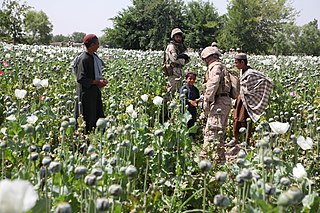Related Research Articles

The Controlled Substances Act (CSA) is the statute establishing federal U.S. drug policy under which the manufacture, importation, possession, use, and distribution of certain substances is regulated. It was passed by the 91st United States Congress as Title II of the Comprehensive Drug Abuse Prevention and Control Act of 1970 and signed into law by President Richard Nixon. The Act also served as the national implementing legislation for the Single Convention on Narcotic Drugs.

While recreational use, possession and trade of non-medicinal drugs described by the Opium Law are all technically illegal under Dutch law, official policy since the late 20th century has been to openly tolerate all recreational use while tolerating the other two under certain circumstances. This pragmatic approach was motivated by the idea that a drug-free Dutch society is unrealistic and unattainable, and efforts would be better spent trying to minimize harm caused by recreational drug use. As a result of this gedoogbeleid, the Netherlands is typically seen as much more tolerant of drugs than most other countries.

The term narcotic originally referred medically to any psychoactive compound with numbing or paralyzing properties. In the United States, it has since become associated with opiates and opioids, commonly morphine and heroin, as well as derivatives of many of the compounds found within raw opium latex. The primary three are morphine, codeine, and thebaine.

The Misuse of Drugs Act 1971 is an Act of the Parliament of the United Kingdom. It represents action in line with treaty commitments under the Single Convention on Narcotic Drugs, the Convention on Psychotropic Substances, and the United Nations Convention Against Illicit Traffic in Narcotic Drugs and Psychotropic Substances.

Cannabinol (CBN) is a mildly psychoactive cannabinoid that binds to the cannabinoid receptors with more selectivity for CB2 over CB1 found in trace amounts from Cannabis. CBN is mostly found in cannabis that is aged and stored, and is derived from the plant's main psychoactive chemical, tetrahydrocannabinol (THC).

In the United States, the removal of cannabis from Schedule I of the Controlled Substances Act, the most tightly restricted category reserved for drugs that have "no currently accepted medical use,” has been proposed repeatedly since 1972.

The Single Convention on Narcotic Drugs, 1961 is an international treaty that controls activities of specific narcotic drugs and establishes a system of regulations for their medical and scientific uses.
The International Narcotics Control Board (INCB) is an independent treaty body, one of the four treaty-mandated bodies under international drug control law.
The expression International Opium Convention refers either to the first International Opium Convention signed at The Hague in 1912, or to the second International Opium Convention signed at Geneva in 1925.

The United Nations Convention Against Illicit Traffic in Narcotic Drugs and Psychotropic Substances of 1988 is one of three major drug control treaties currently in force. It provides additional legal mechanisms for enforcing the 1961 Single Convention on Narcotic Drugs and the 1971 Convention on Psychotropic Substances. The Convention entered into force on November 11, 1990. As of June 2020, there are 191 Parties to the Convention. These include 186 out of 193 United Nations member states and the Holy See, the European Union, the Cook Islands, Niue, and the State of Palestine.

The Commission on Narcotic Drugs (CND) is one of the functional commissions of the United Nations' Economic and Social Council (ECOSOC), and is the central drug policy-making body within the United Nations System. The CND also has important mandates under the three international drug control conventions, alongside the three other treaty-mandated bodies: United Nations Office on Drugs and Crime, World Health Organization, and International Narcotics Control Board.

In the United States, increased restrictions and labeling of cannabis as a poison began in many states from 1906 onward, and outright prohibitions began in the 1920s. By the mid-1930s cannabis was regulated as a drug in every state, including 35 states that adopted the Uniform State Narcotic Drug Act. The first national regulation was the Marihuana Tax Act of 1937.
A drug policy is the policy regarding the control and regulation of psychoactive substances, particularly those that are addictive or cause physical and mental dependence. While drug policies are generally implemented by governments, entities at all levels may have specific policies related to drugs.
The illegal drug trade in China is influenced by factors such as history, location, size, population, and current economic conditions. China has one-fifth of the world's population and a large and expanding economy. China's large land mass, close proximity to the Golden Triangle, Golden Crescent, and numerous coastal cities with large and modern port facilities make it an attractive transit center for drug traffickers. Opium has played an important role in the country's history since before the First and Second Opium Wars in the mid-19th century.

The Convention on Psychotropic Substances of 1971 is a United Nations treaty designed to control psychoactive drugs such as amphetamine-type stimulants, barbiturates, benzodiazepines, and psychedelics signed in Vienna, Austria on 21 February 1971. The Single Convention on Narcotic Drugs of 1961 did not ban the many newly discovered psychotropics, since its scope was limited to drugs with cannabis, coca and opium-like effects.

The League of Nations was established with three main constitutional organs: the Assembly; the Council; the Permanent Secretariat. The two essential wings of the League were the Permanent Court of International Justice and the International Labour Organization.

The International Nonproprietary Name Dronabinol, also known as delta-9-tetrahydrocannabinol, or under the trade names Marinol, Syndros, Reduvo and Adversa, is a generic name for the molecule of delta-9-tetrahydrocannabinol in the pharmaceutical context. It has indications as an appetite stimulant, antiemetic, and sleep apnea reliever and is approved by the FDA as safe and effective for HIV/AIDS-induced anorexia and chemotherapy-induced nausea and vomiting only.
Cannabis in Latvia is illegal for recreational and medical purposes, but production of industrial hemp is permitted.

Cannabis reform at the international level refers to efforts to ease restrictions on cannabis use under international treaties. Internationally, the drug is in Schedule IV, the most restrictive category, of the Single Convention on Narcotic Drugs. As of January 1, 2005, 180 nations belonged to the Single Convention on Narcotic Drugs.
References
- Ratifications.
- Cannabis: Our Position for a Canadian Public Policy, Report of the Senate Special Committee on Illegal Drugs, September 2002.
- Evolution of international drug control, 1945-1995, Bulletin on Narcotics, 1999.
- www.druglibrary.org